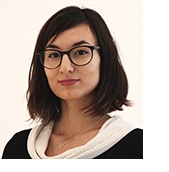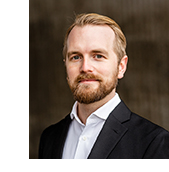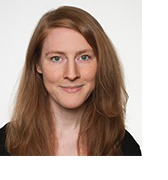|

Iulia Lungu, started a PhD after graduation
Why did you decide to study Computational Neuroscience at the BCCN Berlin?
First of all, because of its reputation as one of the best Computational Neuroscience institutes in Europe, if not the world. Secondly, because of the numerous partnerships the BCCN Berlin has and the various possible paths one could choose after completing the program.
What did you enjoy most about the master’s program?
I greatly appreciated how well-structured the program was and how interesting and challenging yet approachable the tasks and the projects were. I liked the diversity of topics covered and found the professors teaching them very knowledgeable and eager to not only share that knowledge with us, but also to make sure we become good scientists. The whole atmosphere was very friendly, with the regular social component and the admins being very helpful and supportive.
After graduating in 2016, you started doing your PhD at ETH Zürich in Switzerland. What motivated you to stay in science?
I always wanted to do science but did not plan to stay in academia at the beginning of my master's degree. However, during the MSc I got to work as an assistant with another BCCN partner, Michael Schmuker, on neuromorphic computing. The topic fascinated me, and Michael was an absolutely exceptional supervisor. That inspired me to continue in the field and at the time the industry did not offer many opportunities in neuromorphic computing.
Can you tell us more about your research area? What is the most fascinating part of this field?
After my PhD project started it unfortunately became clear that the direction of the overarching project had shifted away from neuromorphic computing and towards machine learning. I had to adapt and find my way in a largely unfamiliar research area, which was a great exercise and a welcome challenge now that I look back at my PhD. I explored various topics in deep learning, particularly incremental and low-shot learning. I am particularly fascinated by the speed at which this field is advancing, the impact it already has on the world and the potential it holds for the near future.
Do you have any advice for current and prospective Computational Neuroscience students?
This does not only apply to Computational Neuroscience students, but to students who want to do science in general. One of the most important lessons I learned during my PhD is that if you are not sure you want to stay in academia or you don't have a burning scientific question that keeps you up at night that you want to solve or if you don't know how well you will get along with your future supervisors, do not commit to a PhD. Think hard about what truly makes you happy, not only what scientific topic is vaguely interesting to you, test the industry too and do at least one long internship before deciding where you want to go next. You should start a PhD only when you are sure you know what that choice implies.
Did your professional goals/perspectives change during your studies?
Before I started the MSc, I only knew that I wanted to develop intelligent machines. I did not know exactly how hard that would be and what it meant. The master's degree made me understand the various nuances of human intelligence and brain research. It helped me crystallize my interests and shape a realistic path towards my goals.
How do you view your time as a student at the BCCN Berlin in retrospect?
I always tell my friends that my master's degree was the best experience I have had as a student. I think of that time fondly. I wish more academic degrees were as rigorous and inspiring as the MSc at BCCN Berlin.
What are your plans for your future career? Will you stay in science?
I am involved in a startup that some of my colleagues at ETH and I founded during our PhDs so after graduation I will focus on that for a while. I do not plan to stay in academia, but I am hoping to continue doing science. My plan for the future is to do work that has a more immediate impact on the world than what I have been able to do so far in academia.
Do you have any advice for future female students in the field of computational neuroscience?
Do not be afraid of asking questions, speaking up and challenging the status quo. Seek out like-minded individuals and build a support network. This is one of the best things you can do for your career.
When I think back to my time as a student at the BCCN Berlin, I remember…
Prof. Michael Brecht asking fun but uncomfortable questions very early in the morning. :-)
Erik Rehn, worked in an AI start-up after graduation
Why did you decide to study Computational Neuroscience at the BCCN Berlin?
After finishing my bachelor’s degree in electric engineering, I didn’t find any of the master’s programs my university offered that interesting. However, I had read a lot of philosophy and was, and still am, very interested in the riddle of consciousness, intelligence, and the really big questions related to that. Reading about the experiments by Libet on split-brain persons as a teenager, and their potential implications for the question of free will, was an eye-opener for me. I had also been in Berlin a few times and had been looking for an opportunity to study there, so when I found the BCCN program on TU’s website it seemed like a perfect fit.
What did you enjoy most about your master’s program?
Getting the opportunity to interact with top researchers in computational neuroscience and getting exposed to the latest research. I enjoyed the very academic atmosphere where people around me had true interest and expertise in the topics they were studying.
After graduating in 2013, you started working at Flow Neuroscience in Sweden. What is your job about? Can you tell us a little more about the company’s mission and your role within the company?
After graduating I was offered to go to the US and work for a Silicon Valley-based AI startup called Vicarious. This was before the huge deep learning and AI hype so it was actually hard to find companies doing really interesting AI research back then. Vicarious are doing fundamental research in brain-inspired computer vision and robotics so that was a great experience.
In 2016, I came back to Europe and co-founded Flow Neuroscience together with a friend I had met during one of my lab rotations that were part of the master’s program. Flow Neuroscience is founded with the mission to develop new ways to treat mental health issues using neuroscience and technology. Our first product, called Flow, is a treatment for depression that combines a wearable for electrical brain stimulation with app-based behavioral therapy. Flow is an alternative or complement to antidepressant medication and I’m very proud that we have managed to get it approved as a treatment in the EU. Roughly 10% of the population in the EU and the US take antidepressants and WHO ranks depression as the #1 cause of disability in the world. Hence, new approaches to treatment are badly needed.
I’m the CTO of the company and basically lead the design and development of the software, hardware, and also the regulatory process to get and maintain all the approvals needed to sell a medical device. I’m also heavily involved in the marketing and business strategy of the company.
Which important skills for this position did you acquire because of your master studies at the BCCN Berlin?
When I started the master studies I had barely read a research paper. The exposure to research and also working in research groups during the lab rotations gave me the basic skill set to read and understand papers, and judge their quality in the fields I was interested in.
Do you have any advice for current and prospective Computational Neuroscience students?
The brain is one of the last frontiers of science where we still know very little. It is hard to imagine anything more interesting to study. Biology always seemed a bit too messy for my taste so a more theoretical/computational perspective makes a lot of sense to me.
During the studies don’t just focus on the things that are going on in the labs closest around you and what your lecturers talk about. Branch out and look for interesting ideas that might not be accepted and mainstream yet. I did my most important lab rotation outside the BCCN in an Italian lab that was mainly focused on fingerprint recognition. The professor there had a side-project around brain-inspired machine learning that I found fascinating. It was the work I did with him that later lead to the offer to go to Silicon Valley.
Did your professional goals/perspectives change during your studies?
For me, the point of studying is to expand one’s horizon and to see new possibilities. When I started the master’s program, machine learning was not something that was hot and talked about much. Learning about that and see its potentials changed my perspective on what was possible to do.
On the other, I had founded a company before I started the master’s studies and knew from that experience that I enjoyed the challenges that come with entrepreneurship. To found a company related to neuroscience was a goal I had before starting at BCCN Berlin.
How do you view your time as a student at the BCCN Berlin in retrospect?
I think it was really great. It was a true privilege to be part of a relatively small community and get access to top research groups in the neuroscience field.
What are your plans for your future career?
Currently, the focus is very much on Flow Neuroscience and our first mission to challenge the overuse of medication for the treatment of clinical depression. Longer-term I actually would not mind going back to studying and do a Ph.D.
When I think back to my time as a student at the BCCN Berlin, I remember…
The most memorable part of the studies for me was to write my master thesis. It was such a great experience just to be able to focus on one particular and narrow problem for half a year. This was very different from my current work running a startup. But I guess you always miss what you don’t have...
I was also fortunate to have a great and diverse class, we had a lot of fun together with Berlin as our playground. Berlin will always be one of my favorite cities.
|
|

Katharina Wilmes, continued with a Postdoc after her PhD
Why did you decide to join the PhD Program Computational Neuroscience at the BCCN Berlin?
I knew about the program because I had friends in the MSc program at the BCCN, who were very fond of it. So I expected a great quality of the organisation and the courses in the programme. I liked the idea of doing my PhD being part of a graduate school. The interactions and social activities with other PhD students, the additional training, but also the freedom of the fellowship were very attractive to me.
What did you enjoy most about the program?
The community and the support that came with it. The monthly social meetings, the quarterly PhD symposium, where we discussed a variety of scientific projects, the talk series with external speakers, the yearly retreat, where we spent a great time together and with external guests. It was also very useful to have an experimental co-supervisor as part of the programme and to get feedback on the project in the yearly progress reports.
You continued with your education with starting a Postdoc at the University College in London. What motivated you to stay in science?
Doing research has so many rewarding aspects to it: the incredible freedom to work on an exciting topic, the variety of the tasks involved, learning new skills and methods all the time, thinking about problems no one has solved yet. I deeply enjoy teaching and explaining, as well as discussing and presenting research. I even like writing manuscripts, which I think not everyone does. And one gets to interact with many great minds. I had and still have so many questions about how the brain works, I really could not just leave it there after the PhD.
In which research area are you now? What is the most challenging about this field?
I am still in computational neuroscience. That is a good question. One aspect to it is that computational neuroscience is a young field, very diverse and there is not really an established approach in the field, which can lead to tough criticisms. This can also be a good thing though. What is great about it is that there are still many different open paths to be explored.
Do you have any advice for current and prospective PhDs in Computational Neuroscience?
Find a topic or question that excites you and go for it. Find one that fits with your supervisor or for which you can find a supervisor because it will be hard to do the PhD without one. Always reflect on whether your approach brings you closer to answering that question. Discuss your work with as many people as possible to get different perspectives. Get to know different approaches within the field, e.g. by visiting a summer school.
For prospective students specifically:
If you are looking for a lab to join, visit that lab and talk to the people in the lab and ask them whether they are happy. It is important that you get along with your supervisor. If possible, do a lab rotation first. You are going to spend years in that lab, better choose wisely.
Do you have any advice for future female students in this field?
I think I might have some advice which would be good for any student, who would not think of the following themselves: find mentors (fellow students, postdocs, PIs) and ask them for advice when you have any question or don't know how to deal with a situation. Never be shy to ask and seek help. Don't expect yourself to know it all from the beginning. Socialise with your lab, eat lunch together, meet after work, start a brainstorming session, be a part of the group.
Did your professional goals/perspectives change during your PhD studies?
Actually not. I wanted to do science when I started and when I finished. Maybe, in the beginning, I thought that some people are more made for science than others. And that the PhD will tell whether I should continue. I now think that everyone who enjoys doing science and makes an effort to do it well can do it. But and there are a few big buts. Science is tough and there are sacrifices to be made. It is often not possible to stay in one place. You take your work home and often even to bed. Salaries are not the best, but responsibility and workload are high. Also, not everyone will get a position, and the worst: there is luck involved in getting one. Therefore, not everyone is made for science indeed, but in quite a different way than I had imagined.
How do you view your time as a PhD student at the BCCN Berlin in retrospect?
It was fantastic. Of course, doing a PhD is tough at times. My first paper got rejected a few times and I was terribly stressed about it, but the support from the lab and outside of the lab helped me get through these tough times. The group of friends I made through the PhD programme was amazing. I could choose whether and how much I wanted to teach, I had a generous budget for travelling, and I learned a lot in the transferable skill courses. I would do it again.
What are your plans for your future career?
I would like to start a lab. I am currently applying for group leader positions and hope to land one in the near future.
What do you expect from the BCCN Berlin alumni network?
I think the network is great to stay in contact with amazing people with interesting careers. I think it is specifically useful if one considers a career outside of academia because the paths of the alumni are very diverse and inspiring and one does not meet those outside of academia anymore at conferences. It is also useful when staying in academia, to get in contact with diverse scientific disciplines. Of course, it is also nice to meet old friends again.
|
|


